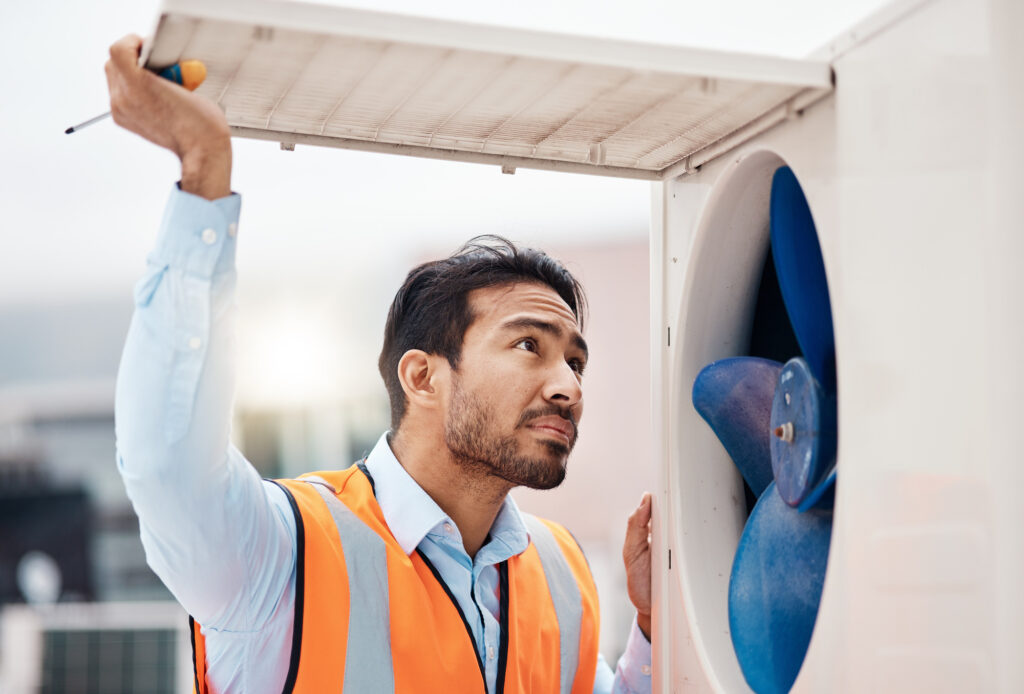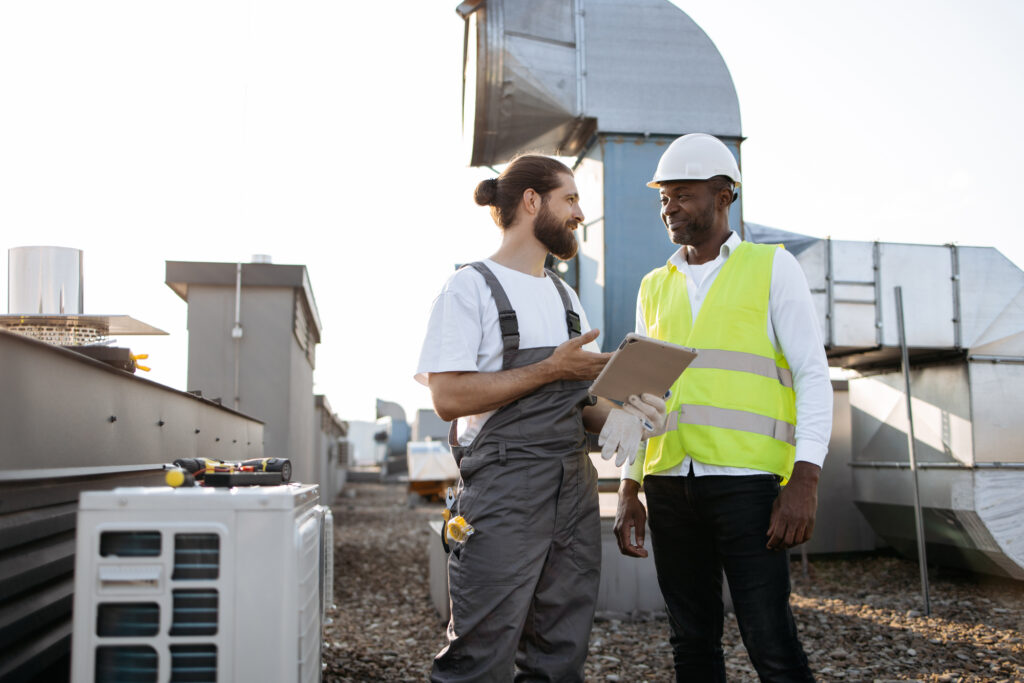If you’re running an HVAC company or managing large-scale construction jobs, understanding the key differences between commercial vs residential HVAC is essential to scaling your workforce effectively. While both involve similar core components, the installation environment, complexity, and labor requirements vary dramatically between the two.
This guide breaks down the operational demands of commercial HVAC systems and residential HVAC systems—from jobsite logistics to staffing needs—so you can plan better, hire smarter, and take on new projects with confidence. Whether you’re focused solely on residential projects or looking to branch into commercial work, temporary staffing gives you the flexibility to meet demand without overextending your internal team.
Key Differences Between Commercial and Residential HVAC Projects
If you’re planning to grow your business—whether bidding on commercial projects or expanding into residential hvac services—understanding the key differences between job types is essential. Each path requires a different approach to equipment, labor, and project management. The more clearly you define the demands of each, the more efficiently you can staff, plan, and scale your operation.
System Size & Scope
Residential hvac units are compact and serve single-family homes, apartments, or condos. These are fast-moving installs, often repeatable across multiple residential units in a development.
In contrast, commercial hvac units tend to support large buildings—think warehouses, retail centers, and office spaces. These units must cool or heat the entire space across zones or floors, which adds layers of complexity and longer install timelines.
Jobsite Environment
Residential hvac work jobs take place in tight quarters—attics, crawlspaces, basements—often with homeowners present. That means technicians need solid people skills and the ability to work independently.
Commercial hvac work is typically done on rooftops or inside mechanical rooms, often during construction or scheduled facility downtime. Jobsite safety and coordination with other trades are bigger priorities.
System Complexity
Most residential systems are self-contained with standard layouts—one or two air conditioning units, ductwork, and basic controls.
Commercial systems, on the other hand, are often custom-designed. They may include complex hvac systems like chillers, VRF, or advanced controls tied into building automation systems. These installs require greater expertise and planning.
Crew Requirements
One or two hvac techs can typically handle a residential install from start to finish. That’s ideal for smaller jobs or steady service calls.
Commercial hvac technicians often work in teams, especially on large-scale installs. Roles may be divided between installers, controls specialists, and maintenance techs. Temporary staffing makes it easier to build out the right team for each phase of the project.
Staffing for Commercial HVAC Systems and Residential Projects

Hiring the right people depends on the type of systems you’re working with. Commercial hvac systems demand more technical expertise and teamwork, while residential work calls for flexibility and customer interaction. Matching skill level and experience to project needs ensures smoother execution and fewer setbacks.
Residential HVAC Projects
Residential hvac technicians often work solo or in pairs, handling installations, replacements, and repairs in homes or small buildings. These projects move fast and require techs who can work efficiently in finished spaces.
Most projects involve installing or maintaining a residential hvac system—a standardized unit with minimal variation. Soft skills matter here, as techs frequently interact with homeowners or residential clients.
Commercial HVAC Projects
Commercial hvac technicians typically work on larger teams and need experience with systems like chillers, VRF, and advanced controls. Projects may include hospitals, schools, and commercial buildings, where complexity and coordination with other trades are expected.
A typical job might involve assembling a multi-zone commercial hvac system, reading plans, or working within a broader construction schedule. These techs need mechanical knowledge, safety certifications, and often, experience with lift equipment or rooftop installs.
How to Hire for Commercial HVAC or Residential Work
When hiring for commercial hvac or residential projects, the process isn’t one-size-fits-all. Techs must bring the right combination of technical experience, certifications, and environment-specific strengths. Clear role definitions help ensure projects are completed on time and up to spec.
What to Look for in Residential Techs
Many residential technicians start with basic installs and learn on the job. That makes residential projects a good fit for apprentices or junior-level hires—especially when supervised by a more experienced tech.
Ideal candidates for residential work are strong communicators, capable of working independently, and comfortable navigating tight indoor spaces like attics and crawlspaces.
What to Look for in Commercial Techs
Commercial techs should have a history of working on large or complex systems. They should be able to read schematics, follow safety protocols, and work efficiently in busy construction environments.
Look for those with specialized knowledge in BAS controls, VRF systems, or rooftop unit installs—especially when staffing for hospitals, schools, or government facilities.
Why Temporary Staffing Works for Commercial and Residential HVAC
Temporary staffing offers flexibility and speed that’s hard to match with full-time hiring—especially for businesses balancing commercial and residential hvac projects. It helps you scale with demand, reduce overhead, and avoid project delays when timelines tighten or labor gaps appear.
Residential Benefits
Temporary labor helps cover seasonal spikes when residential techs are stretched thin during summer and winter months. It also allows you to keep up with volume in multi-home developments without adding long-term payroll costs.
It’s also useful when your core team is busy handling service calls or higher-priority installs. Temp staffing gives you breathing room without leaving residential clients waiting.
Commercial Benefits
Staffing flexibility is especially valuable when working on commercial builds or commercial ac system retrofits. Temporary crews let you scale up during specific install phases or maintenance windows without long onboarding.
For large office buildings, hospitals, or campuses, temp labor also helps you meet tight timelines without overcommitting your core team.
Industries That Depend on Air Conditioning Expertise
Across sectors, large-scale HVAC installs require skilled labor that can be scaled up quickly. Whether you’re managing installs in new commercial buildings or maintaining older residential units, temporary staffing gives you the ability to match labor to project demand without delay.
Healthcare Facilities
Healthcare facilities demand strict air quality control to protect patients and meet regulatory standards. These projects often involve clean rooms, isolation areas, and specialized filtration systems.
Commercial hvac services for hospitals are typically performed during scheduled shutdowns, off-hours, or under strict supervision—making flexible, experienced crews essential.
Education & Campus Projects
Schools and universities often complete full hvac unit upgrades during summer or winter breaks. Timelines are short, so staffing has to ramp up quickly.
Whether the work involves classrooms, dorms, or administrative buildings, you may need to staff both the commercial or residential side of the HVAC trade depending on system type and scope.
Hospitality & Large Residential Properties
Hotels, resorts, and multifamily properties often feature both residential and commercial HVAC systems. Projects may include common-area chillers or in-unit residential ac replacements across dozens of rooms.
Work must be done quietly, efficiently, and without disturbing guests—making temporary staffing a key asset for phased installs.
Industrial & Manufacturing Facilities
Factories and warehouses rely on HVAC for process control and workforce safety. Whether you’re servicing heavy cooling equipment or upgrading ventilation systems, OSHA compliance and rapid execution are a must.
In some office or break areas, a residential hvac system may be used alongside larger infrastructure—requiring techs who understand both.
Government & Military Buildings
These projects often require clearance, precise scheduling, and adherence to strict specs. Temporary crews let you meet deadlines without full-time onboarding or overhead.
Property managers and facility directors in these roles frequently partner with local businesses that can staff up quickly for HVAC retrofits, repairs, or complete system installs.
Scaling to Meet Commercial HVAC Services Demand

As demand rises for retrofits, system replacements, and high-efficiency upgrades, many contractors need to scale quickly for commercial hvac services without stretching their core team too thin. Temporary labor makes that possible—letting you meet deadlines, win larger bids, and respond to last-minute scope changes.
Public Sector & Government Projects
Whether it’s a city hall, school district, or military facility, these jobs often require fast turnaround with strict oversight. Temp crews can support both residential jobs (like admin offices or housing) and larger commercial work like equipment rooms and chillers.
Private Sector & Facilities Management
From corporate offices to retail chains, building operators rely on outside labor to manage seasonal demand and urgent system failures. Supporting these residential projects and commercial builds with qualified crews can also help retain staff—especially as competition grows and the median annual wage for HVAC roles increases.
What to Know About HVAC Pay When Hiring
Understanding current pay trends for both commercial hvac technicians and residential hvac technicians helps you budget wisely, remain competitive, and hire effectively—whether for short-term projects or long-term growth.
Commercial HVAC Pay Trends
Commercial hvac pay is typically higher due to job complexity, safety compliance, and specialized system knowledge. Techs may be certified in BAS, VRF, or OSHA regulations—especially when working in hospitals, campuses, or government facilities.
Enrolling junior techs in a training program or using temporary labor for specific install phases can help balance cost. For seasoned commercial pros, advanced certification is the ultimate salary booster and often a requirement for top-tier projects.
Residential HVAC Pay Considerations
Keywords used: residential hvac technicians, high school diploma, job satisfaction
Residential hvac technicians may earn less on average, but they often complete more jobs per day and supplement hourly rates with performance-based bonuses or sales commissions. Many enter the trade after earning a high school diploma and learning on the job.
For entry-level workers, residential roles can offer strong job satisfaction due to personal interaction and task variety—making it easier to recruit and retain new talent, especially in local markets.
What to Know When Installing Air Conditioning Units at Scale
Large projects involving multiple air conditioning units—such as apartment complexes, hotels, or senior living facilities—require predictable labor, clear timelines, and minimal disruption to surrounding residents or guests.
Temporary crews allow you to complete installs in phases, avoid burnout among your full-time team, and maintain momentum across buildings or unit blocks.
Standardized Installs = Ideal for Temp Crews
Most apartment or hospitality installs rely on a residential hvac unit—standardized equipment that experienced techs can install efficiently and repeatedly.
Temporary labor is a great match for residential systems like these, where crews can focus on one install type across many units without the need for extensive site training.
How Tradesmen International Supports Your Workforce Needs
Whether you’re managing residential projects or tackling complex commercial hvac work, Tradesmen International helps you stay on schedule and under budget with access to highly qualified HVAC labor.
We provide:
- Skilled, safety-trained HVAC technicians for all project types
- Local support with national reach
- Flexible labor options without long-term payroll strain
- Certified crews for installs, maintenance, and emergency work
You get access to professionals who are ready to work—so you can meet your project goals without slowing down or stretching your internal team too thin.
